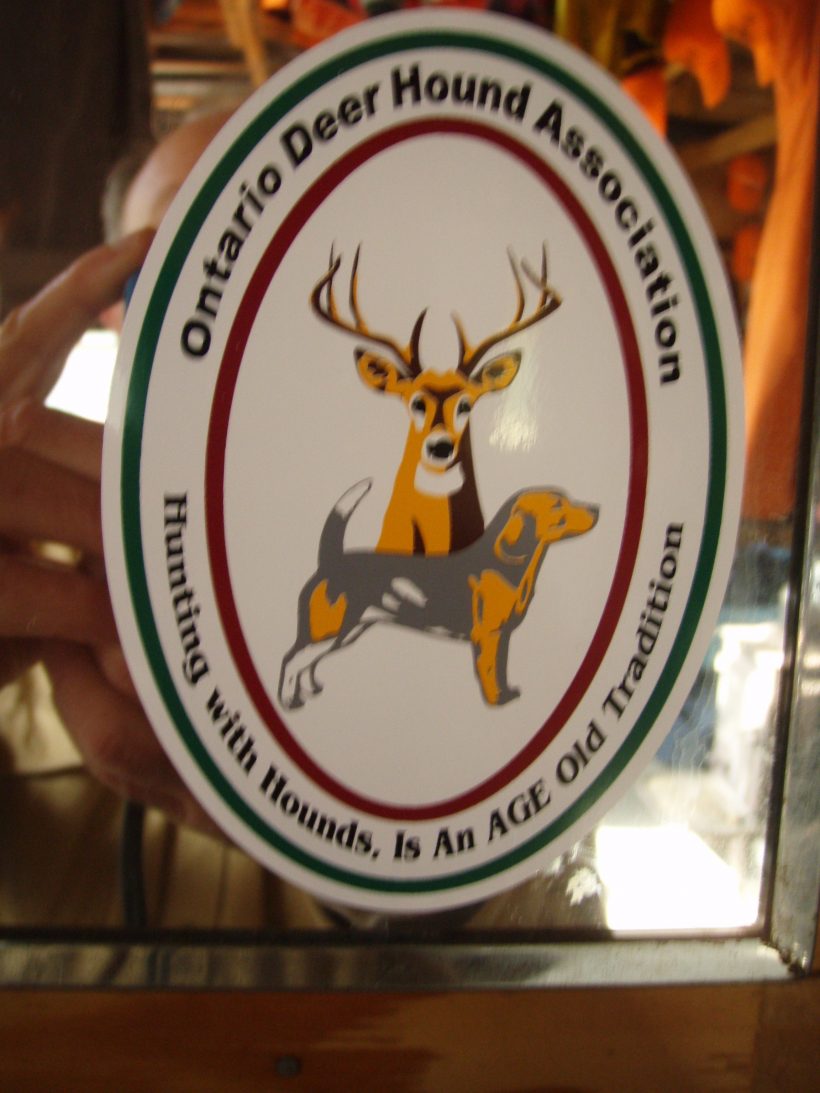ONTARIO DEER HOUND ASSOCIATION CORRESPONDENCE – 2009 – 2023-10-15
The Ontario Deer Hound Association (ODHA) was formed in February 1999 by dedicated deer hunters/houndsmen who were concerned with the increasing threats to terminate deer hunting with hounds in Ontario. They recognized that it was crucial to unite as one organization to protect their passion.
In 1980 I began penning 51 outdoor columns a year in The Bancroft Times, one of the few independently family owned papers in the province at that time. My first correspondence from Lyle Sawyer, Membership Chair from the beginning, was during 2009. I suspect my friend Murray Locke of Campbellford was the motivator.
A not for profit organization, the ODHA promoted, encouraged and protected the right to hunt deer with hounds in this province. The most recent correspondence states that the ODHA is a voting member of the Ontario Sporting Dog Association currently representing approximately 100 different dog clubs.
2009
The annual ODHA meeting was scheduled for November 29, 1t 1:00 p.m., at the North Hastings Community Fish Hatchery on the Hysert Road. The organization had commissioned the NHHS woodworking class to build 19 dog houses for their Temporary Shelter Program. Freymond Lumber provided the lumber, RONA the hardware and Lyle Sawyer painted them a distinctive purple with donated paint. In its newsletter members were reminded to mark their dogs with CLEAR and READABLE information and to make sure that the dog collars bear your name and current phone number. It cautioned against hanging pet tags that can catch on branches and “come off”. In 2008 the shelter program returned about 85% of the lost dogs to their owners. It also advised against taking the non hunting family pet to camp. “Don’t – Many pets are not bush wise and the saddest situation we face is talking to family members, particularly children, about a lost pet.”
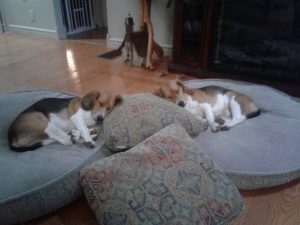
November 29 witnessed one of the best turnout in years. Individual memberships cost $10; hunt camps $45. Hunting camps should include names of members, their addresses and phone numbers plus the hunt camp name if appropriate with phone number and postal code. The ODHA was planning to revamp its website. President Dennis LeFeuvre noted that more deer hunters were using tracking collars which made finding lost dogs much less a challenge. “Many dogs were returned to their owners before going to one of the temporary shelters,” said LeFeuvre. 80 dogs were reunited this year.
A discussion of the merits of straw vs. wood shavings resulted in a change of policy. In 2010 the shelters may request either. One disadvantage to straw is Foxtail barley which has killed dogs. It has large bristles (called awns) that are capable of entering the body and, like porcupine quills, travel in one direction. They can enter the blood stream and autopsies have discovered an accumulation of awns in the heart. As for wood shavings there was some discussion of soft wood vs. hardwood. To decide do some research.
2010 THE STEPHENS’ STOCK CUR
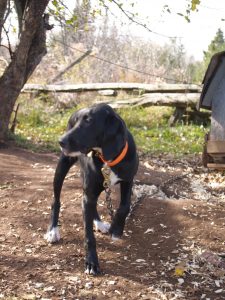
The world of dogs is ever expanding with new breeds emerging globally. The Stephens’ Stock Cur (SSC) belongs to the cur dog breed and is a scent hound. It originated in Kentucky with the Hugh Stephens’ family who bred them for more than a century. Locally known as “little darkies” (they are predominantly black, and short haired with some white markings) the dog was recognized as a breed of cur in 1988.
A medium sized dog with long legs, the dog covers ground with “blazing speed”, as described by one owner. Known as a hard hunter it is apparently the fastest of cur dogs. Its intelligence lends it as a natural hunter or watchdog. One write-up suggests that its barking ability is better than any other cur. It gets along with other dogs (a big plus) and pets. The SCC is used for squirrel, raccoon and, as l discovered is quite adept at cervids. The cur reportedly has very good stamina, a necessity for moose and deer.
2011
The ODHA changed the date of its annual Campbellford meeting from after the annual rifle season to early September. President Bill Gordon announced that attendance at the meeting was up by 30%. He is hoping this date change will attract increased numbers to the annual. Due to this change the financial report was not as thorough because the books were being audited. Membership for 2010 included 110 individuals and 34 hunt camps.
2012
With deer season rapidly approaching the ODHA is once again preparing to run the Temporary Shelters which should be advertised, as in past years, in the local papers. Make sure your dog’s vaccinations are up-to-date and don’t forget your dog’s hunting licence. If you don’t the MNR may decide that no one uses dogs to hunt and might be tempted to terminate their use deer hunting. The cost this year is $12.67, an increase of .29 cents.
2013
DOGGING IT
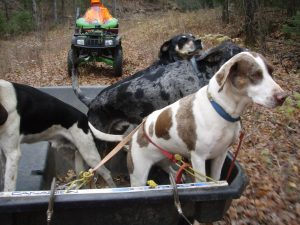
Traditionally deer season has meant guns and hounds. “The Chase”, as it once was known, used to close down the town, still a village to some, of Bancroft. There were no traffic lights, no fast food, no police service after midnight and the sidewalks were rolled up late Saturday night. In fact, in the early ‘70s, after the police service ended for the day main street became drag strip central.
To-day there are more deer hunting opportunities with the introduction of bow seasons and controlled hunts. Some would anecdotally argue there are more deer around. Relative to where you hunt of course. The ODHA continues to operate its Temporary Shelters, all run by volunteers and funded by the association.
There has been some talk that misguided individuals have been known to capture lost hounds, remove their tracker collars and throw them into a lake or river.
Last year, near the end of the day, a beagle, complete with collar and antenna, showed up and curled up at the base of my tree stand. After l descended it followed me back to camp. I put the tuckered beagle in our rather nice unused dog kennel, gave it some water, and briefly went into the camp. While inside, unknown to me, a pickup arrived. The hunter was tracking his hunter electronically. Fortunately for me another camp member watched the owner retrieve his dog and leave or l would never have known.
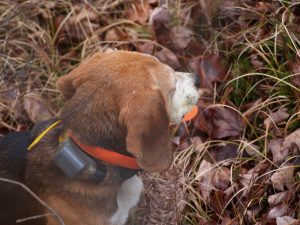
We don’t run dogs anymore. One year we rented a dog and on the first hunt we heard one bark and it headed home to Madoc. The next year we rented two dogs. One ended up in Peterboro, t’other just stayed in camp. End of renting dogs. As one member said, if you hunt with a retriever at the day’s end you’ll never have to go looking.
Bob Renshaw has a deer camp on the Hackamatac Road near Coe Hill. His daughter, Darlene, does the dogging with mixed breeds all including retriever blood. She has 4 dogs, 2 Siamese cats and a Conure – a small parrot. Her daughter told her teacher that they had a pet Condor!
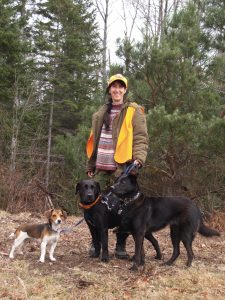
Three of the mixes are big dogs containing retriever, chow, hound, shepherd, mastiff and boxer. The fourth, which looks like a Jack Russel, also contains some pug.
“She hates the water,” said Darlene. “She’s the barker when on deer. The others run so quietly that we bell them so stand watchers can hear them.”
“One of the dogs is a ground scenter, another an air scenter. They keep an eye on each other.”
Darlene uses her compass because of the swamps where no matter how well you may think you know your way it’s still easy to get disoriented.
“If you were here yesterday at this time you would have seen some action,” she told me, and recounted how they successfully harvested a buck. She said this buck snarled and growled. “I didn’t know they could do that.”
The key to success when training deer dogs comes when the hunters drop a deer in front of them. It’s like Pavlov’s dog. “Once they are in on a kill the connection is made.”
2014
Lyle Sawyer of the ODHA has sent out the Fall Newsletter announcing the annual membership meting on Sunday, December 14 at 1:00 p.m. at the Campbellford Wholesale Co., 11 Industrial Road. There will be temporary volunteer shelters at: Bancroft (Mary LeFeuvre), Boulter General Store (Dave Peck), Cooper (Betty & Elton Ferguson), Gunter (Ron Potts), Madawaska (Luanne Hilderbrant), Maynooth (Mark Sills), Millbridge Pound (Jerry Hawkins), and North Baptiste Lake (Dwight Sears). Sawyer advises phoning first.
“Our shelters have been averaging about 95 dogs a season,” said Sawyer. The ODHA provides dog houses, bedding and food. Purina is providing the dog food free of cost. Agribrand, Cooney Brothers (Hoards Station Feed Mill) and Campbellford Wholesale are major supporters of the not for profit ODHA.
Industry Canada has promised that 2014 would be the year that Multi-Use Radio Services (MURS) would be allowed in Canada. Promised, but not delivered. MURS are GPS units that permit houndsmen to track their charges more accurately and as one member wrote, “If they are getting too close to a hazard it allows me to intervene.”
Peter Hill, Industry Canada, has deferred the introduction until a “clearer indication of actual need is provided by advocates.” Hill can be reached at: 300 Slater Ave., Ottawa, On, K1A 0C8.
Single memberships have declined while camp memberships are holding their own. Canada Post increases continue to erode funds and some hunt camps and individuals have donated to deflect those costs.
2015/16
The ODHA has operated volunteer shelters since 2002. The number has dwindled from 8 to 5. Fewer lost dogs (a high of 92 to 20 in 2015), fewer camps hunting with hounds, and more efficient tracking collars are just a few reasons for downsizing. Those remaining open have had the highest traffic record in 2016: Bancroft (Municipal Pound), Boulter General Store, Madawaska, North Baptiste Lake, and Gunter.
The Municipal Pound will allow any card carrying member of the ODHA to retrieve their dogs free of charge. “Please use discretion when phoning any shelter and check the time of day first.” The pound’s hours of operation are 4:30 p.m. to 6:00 p.m. daily. It is located at 326 Monck Road. Mary LeFeuvre has agreed to be the intermediate contact.
The ODHA has financially supported Kids’ Fishing Days, the Wonder of Wetland Program, the NHHS NOS program and Hunter Education.
The Newsletter bemoans the decline in deer numbers, especially when compared to a decade ago. New wolf/coyote regulations “will affect all resource users in Central Ontario…It appears that although MNRF routinely refers to ‘Moose Management’ or ‘Deer Management’ they prefer to use the term ‘Canid Conservation’ to appease the interests of…not us anyway. What we desperately need is ‘wolf management’”. The Newsletter states we also need ‘Bear Management’ in the “equation of ungulate populations as we now have bears as far south as Belleville and have had for some time.”
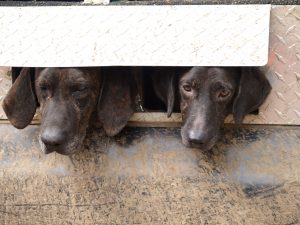
Regarding the new hunting and trapping regulations pertaining to coyotes and wolves the ODHA affirms that those “responsible for the hastily made decision to add 39 townships to the 42 that are already prohibited should be held accountable for the further decline in deer populations in traditional hound hunting areas.” In addition to previously mentioned supporters there is the “generosity of our own director, Murray Payne who donates all the bedding and the Limerick Lake Hunt Club (LLHC).” Note: the LLHC was a group of local deer camps that no longer exists as the former Domtar lands were privately purchased and many deer camps folded. The territory was purchased June 15, 2012 for $31 million.)
Long standing Recording Secretary Mike Leveque recently passed on and for all who knew Mike they will most certainly miss his friendship and enthusiasm.
For other sources of information goto: www.ontariohuntcampsassociation.com and www.osda.proboards.com.
2017
Volunteer shelters have increased to include: Bancroft Municipal Pound, Boulter General Store, Madawaska, North Baptiste Lake Road, Gunter, Mackenzie Lake and Flinton-Bridgewater Hounds.
The ODHA waits two weeks following deer season before adopting out unclaimed dogs. Using Facebook worked in 2016 for the 7 unclaimed dogs with a “non-hunting couple adopting one.”
The Annual membership meeting has been scheduled for Saturday, November 24 at 11:00 a.m. at the Campbellford Wholesale Co. In 2017 there were a couple of missing hounds that smacked of possible criminal activity according to the Newsletter. As for the proposed BillC71 gun legislation the ODHA reminds our MPs that “we support Crime Control not Gun Control”. Add Campbellford Farm Supply and Randy VanNorman to the list of supporters. The ODHA supported Hunter Ed with the South Central Ontario Fish & Wildlife Association – “Kids who hunt, trap and fish don’t mug little old ladies.”
